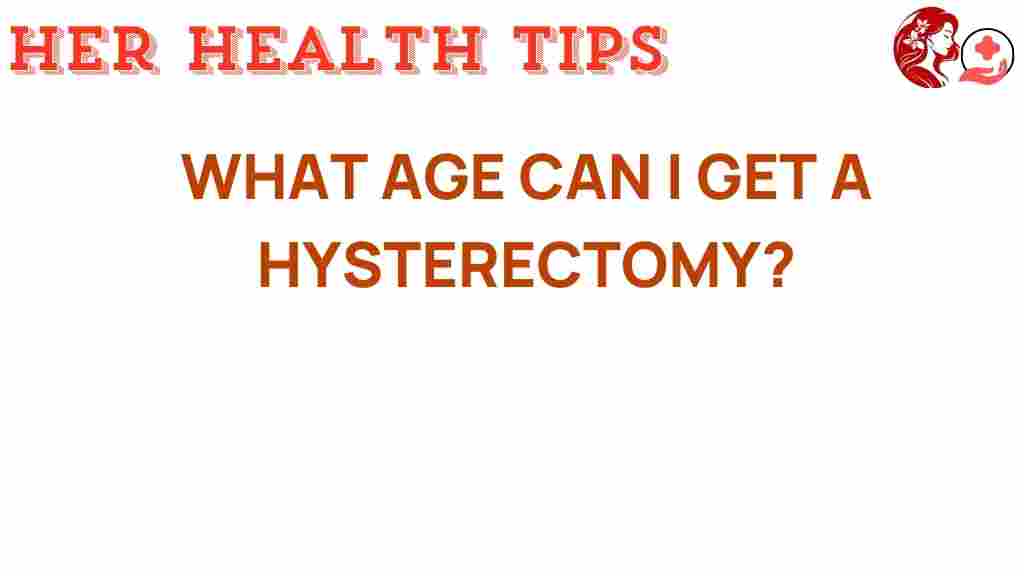The Age Factor: When is the Right Time for a Hysterectomy?
Deciding to undergo a hysterectomy is a significant health decision that many women face at various stages of their lives. This surgical procedure, which involves the removal of the uterus, can be prompted by a variety of reasons, including health issues, reproductive choices, and age considerations. Understanding when the right time for a hysterectomy is can be complex, as it involves evaluating factors such as age, health conditions, and personal circumstances. In this article, we will explore the various elements related to hysterectomy, particularly focusing on the implications of age in women’s health and reproductive choices.
Understanding Hysterectomy
A hysterectomy is a common gynecological surgery that may be necessary for several medical conditions, including:
- Uterine fibroids
- Endometriosis
- Uterine prolapse
- Cancer of the uterus, cervix, or ovaries
- Abnormal bleeding
Hysterectomies can be performed through various surgical options, including abdominal, vaginal, or laparoscopic methods. Each of these options has its own set of benefits and risks, which should be discussed with a healthcare provider.
Age Considerations for Hysterectomy
Age is a crucial factor when considering a hysterectomy. Women typically experience various reproductive health changes throughout their lives, and these changes can greatly influence the timing and necessity of the procedure. Here are some age-related considerations:
- Reproductive Years (20s to 40s): During this stage, many women may experience conditions such as fibroids or endometriosis. A hysterectomy may be suggested if these conditions severely impact quality of life or if pregnancy is not a goal.
- Perimenopause (late 30s to early 50s): As women approach menopause, symptoms such as heavy bleeding or fibroids may worsen. This is often a time when women reassess their reproductive choices and consider a hysterectomy.
- Postmenopause (after 50): Women no longer have menstrual cycles after menopause, and the reasons for a hysterectomy may differ. Conditions like cancer or persistent health issues may necessitate the surgery. However, some women may prefer to avoid surgery if they are not experiencing significant health problems.
Health Decisions Surrounding Hysterectomy
When making health decisions regarding a hysterectomy, consider the following:
- Consultation with Healthcare Providers: It’s essential to have open discussions with gynecologists and healthcare professionals about symptoms, potential risks, and benefits of the surgery.
- Second Opinions: If unsure, seeking a second opinion can provide additional perspectives on the necessity and timing of the procedure.
- Personal Health History: Individual medical history, including family history of reproductive cancers, can play a critical role in the decision-making process.
Steps to Consider Before Hysterectomy
Before undergoing a hysterectomy, it’s advisable to follow these steps:
- Evaluate Symptoms: Assess the severity and impact of your symptoms on daily life.
- Consider Non-Surgical Options: Discuss other treatments that may alleviate symptoms, such as medication or minimally invasive procedures.
- Understand the Procedure: Learn about the different types of hysterectomy and what each entails—abdominal, vaginal, or laparoscopic.
- Discuss Recovery: Understand the recovery process, including potential complications and the expected timeline for returning to regular activities.
Post-Hysterectomy Considerations
After undergoing a hysterectomy, there are several factors to keep in mind:
- Menopause Symptoms: If the ovaries are removed, women will enter menopause immediately, which may lead to symptoms like hot flashes and mood swings.
- Emotional Health: The emotional impact of losing the ability to conceive can be profound. Counseling or support groups can be beneficial.
- Follow-Up Care: Regular follow-up appointments with your healthcare provider are essential to monitor recovery and overall health.
Troubleshooting Common Concerns
Women may have various concerns before and after a hysterectomy. Here are some troubleshooting tips:
- Managing Pain: Discuss pain management options with your doctor, including medications and alternative therapies.
- Addressing Emotional Well-being: Seek support from friends, family, or mental health professionals if experiencing anxiety or depression.
- Staying Informed: Educate yourself about what to expect during recovery and how to care for yourself post-surgery.
Resources for Women Considering a Hysterectomy
For more information on women’s health and gynecological surgery, consider exploring the following resources:
Conclusion
Deciding to undergo a hysterectomy is a highly personal decision that should be made with careful consideration of age, health status, and individual circumstances. Understanding the various factors, including reproductive choices, menopause, and surgical options, can aid in making an informed choice that aligns with one’s health goals. Engaging in open dialogue with healthcare providers and seeking support from trusted resources will empower women to navigate their health decisions confidently. Remember, every woman’s journey is unique, and the right time for a hysterectomy varies from person to person.
This article is in the category Reproductive and created by HerHealthTips Team
